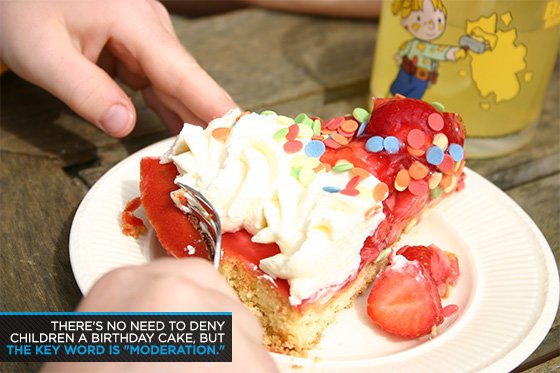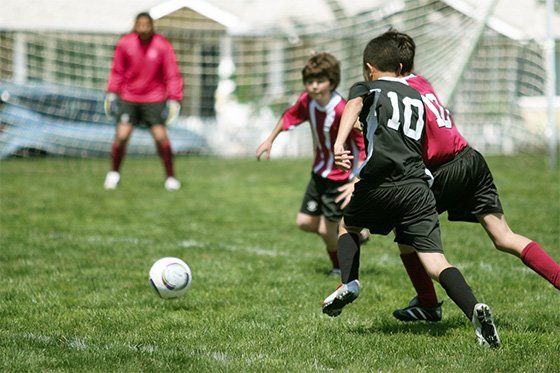If you made a priority list of concerns about your child's safety, it would be stacked with no-brainers like violent video games, inappropriate movies, drugs, alcohol, strangers, busy streets, and texting while driving. But would it include unhealthy food?
Childhood obesity rates are continuously rising. In the past 30 years, obesity has more than doubled among children and tripled among adolescents. It's no secret that this statistic is directly related to diet and food consumed by our children.
Unfortunately, the world we live in makes it easy and affordable to feed our children terrible food. The food industry, much like the tobacco industry, has glamorized and masked unhealthy foods. What kid wouldn't want to eat at fun restaurants that hand out toys and have playgrounds or video game centers? These establishments hook children when they're young and tell them, "Deep down, this is what you really want." Then, as kids get older, they don't have much spending money and end up turning to dollar menus, vending machines, and convenience stores.
The grocery store is better, but barely. Most are filled with aisles of boxed and packaged processed foods that would survive a nuclear war. Much of this food is misleading and proudly advertises "low fat," when in reality it's extremely high in sugar, sodium, unhealthy chemicals, and processed ingredients.
Not all hope is lost, though! It's still possible to help our children to make healthy choices for a lifetime. These seven steps to improve childhood health are a great place to start!

1 / Look for Little Changes That Have Big Effects
Have you let your children eat sugary cereal every morning for breakfast since they could first hold a spoon? Well, that seems like a good place to start. They may fight it at first, but there are plenty of other, healthier things they could be eating. Maybe healthier snacking is a more feasible target for you right now—that's fine. Pick your battle, and go win it!
Instead of thinking solely about the end result, direct your attention toward little steps to achieve the end goal. Little changes make big differences in the long run. As a parent of four (three boys and one girl), I've been through the difficult process to change my family's eating habits. It didn't happen overnight and it wasn't easy, but it was certainly worth it.

2 / Practice What You Preach
You can't tell your children to act a certain way and do the exact opposite. Be an example for them by eating healthy, being physically active, and most importantly, enjoying yourself while you do it! This won't work if it feels like punishment to either you or them. Your children are smart, but there's some real truth behind the old saying, "The apple doesn't fall far from the tree."
3 / Take Out the Trash
My son has a severely overweight friend. When he comes over to play, he always comes with a backpack full of candy bars, soda, and chips. He's a walking convenience store! This is an example of a child who has free access to whatever he wants—or has been led to believe he wants, anyway—whenever he wants.
I'm willing to bet money that most household kitchens have pockets of unhealthy, processed food hidden somewhere in them. My solution: Get rid of the bad food! Go into your kitchen and throw away everything you don't want yourself or your children to eat. Take out the trash and make your kitchen a temple for healthy foods.
There are always healthy alternatives to unhealthy foods, but it's up to you to make the effort to find what works for you and your family. My family threw out processed, sugary, high-fat, chemical-filled foods and added healthier options like natural peanut and almond butter, whole-grain products, fresh fruits, almond cheese, olive oil, garbanzo bean and almond flour, and almonds.

4 / Change Your Lifestyle, Not Your "Diet"
I hate the word "diet" because people immediately think of a temporary adjustment. They then think, "Oh great, I have to eat less food, and the foods will be tasteless." This logic is completely false, but good luck explaining that to your family item-by-item. This is a lifestyle change, so embrace it as one!
Become a student of nutrition and health. Use the Internet as a resource to find information and recipes. Know how to read labels and scan for unhealthy ingredients, and then put that knowledge into action. This helps to create accountability, and accountability promotes success.
5 / Let Them Be Kids—In Moderation
Is living a healthy lifestyle and eating healthy foods critical? Yes! With that being said, kids should be kids and enjoy treats occasionally. For example, there's no way I would deny my children a birthday cake. The key word is "moderation." It's up to you as a parent to determine what moderation means for your family. In my opinion, if you eat something daily, or if you have it in your house all the time, it's not moderate.

Likewise, you can do everything right at home, but you still can't control what your kids eat and do out in the world. An occasional unhealthy meal at a friend's house or at school isn't the end of the world. Think of it this way: Would you prefer that they felt comfortable telling you about it, or that they felt compelled to lie to you? Which one seems more likely to lead to a healthy lifestyle as an adult?
6 / Encourage Physical Activity
You see your kids finally "giving you a break," but I see kids planted on the couch playing video games and watching TV. They need to be outside playing and burning calories! Don't be afraid to join them—after all, this is your lifestyle too, right? Throw the ball around, go for a walk, or let (or make) them help with yard work. I look forward to the day I can take my children to the gym and become their personal trainer. It's a motivator to keep myself healthy.
Change takes time, and it takes your best efforts. But with consistency, these little things can make a big difference in the long run. A healthy lifestyle will prepare your children for success in the future. I want my children to be happy and successful adults, and being healthy and fit are two keys to success.

7 / Educate, Don't Just Dictate
Whether your kids are at home, school, or a friend's house, they need to learn how to make healthy choices on their own. You won't always be there to make the right choice for your child, and if you're just a voice in their head shouting "Don't do that!" they'll learn to ignore you. Ultimately, all you can do is educate them and hope they make the right choice.
At the same time, you must teach them to be respectful of others' lifestyle choices and habits. I tell my children they're good examples to others when they eat healthy. Take your kids shopping, have them help you prepare meals and pack school lunches. Help them understand the thought process and preparation that are part of a healthy life. These activities are authentic and will help your child be more confident to make healthy choices.
